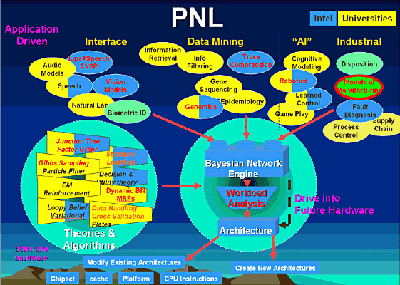Intel says “read my lips” with open source software that predicts users’ needs
Dec 9, 2003 — by LinuxDevices Staff — from the LinuxDevices Archive — viewsIntel researchers have released open source software that is meant to help developers create computers that can “learn” from their experience, using data to proactively improve accuracy and ease of use. The announcement came at the opening of the Neural Information Processing Systems Conference (NIPS2003)… earlier this week.
Intel says its Probabilistic Networks Library (PNL) software and Open Source Machine Learning Library (OpenML) will enable researchers to develop machine learning applications that can estimate the likelihood that something will happen by calculating how often it occurred in the past. According to Intel, the software can be used to enhance a wide variety of interactive and industrial computer applications — everything from combing through huge databases of gene studies, to spotting promising proteins for new drugs, to email systems that model a person's behavior to decide how best to manage newly arriving messages on its own.
“Intel wants computers to be more proactive,” said David Tennenhouse, vice president in Intel's Corporate Technology Group and director of research. “To do this they need to be able to learn from their experiences with users and the world around them. Using new statistical methods to identify key patterns, these systems will start anticipating the needs of their users and pre-computing responses to the most likely questions so that the answers will be instantly available the moment they are needed. Combined with faster microprocessors, OpenML is certain to drive an explosion of machine learning-based applications such as toys that respond to a child's movements and networks of wireless sensors that will enhance our safety, productivity and stewardship of our environment.”
OpenML (not to be confused with the Khronos Group's OpenML, the graphics library) is based on “Bayesian” mathematical principles which essentially are the idea that the probability of future events can be calculated by studying their prior frequency. Because Bayesian models are based on data collected from experience, the more data obtained, the better the predictions, and if the data changes, the results correct themselves.
Faster microprocessors and improvements in the graphical mathematical models at the heart of Bayesian methods are all enabling real-time computer “machine learning” algorithms to run on standard PCs, according to Intel. The computer machine learning library is designed to increase innovation in this field by providing source code for a wide range of machine learning functions.
As one example of OpenML's usefulness, Intel researchers say they used it to help create an audio/video speech recognition system that enables computers to detect a speaker's face with a video camera and track his mouth movements. Learning to “read lips” enables much more accurate speech recognition, particularly at airports, shopping malls and other noisy environments. [more about Intel's lip-reading software can be found here -ed.]

(Click above image to enlarge)
An overview presentation and technical whitepaper about the technology are available here:
Presentation: Open Source Machine Learning
(PDF file download)
Presentation: Open Source Machine Learning
(Powerpoint file download)
Whitepaper: Intel's open-source probabilistic networks library
(PDF file download)
Intel says the open source software release of OpenML includes C++ source code for all of the library's functionality, and a royalty-free BSD-style redistribution license. There are currently three sub-projects:
Further information these technologies can be found at Intel's main OpenML Website, which is located here. Software downloads, including source code and precompiled Windows binaries, are available on SourceForge, here.
This article was originally published on LinuxDevices.com and has been donated to the open source community by QuinStreet Inc. Please visit LinuxToday.com for up-to-date news and articles about Linux and open source.